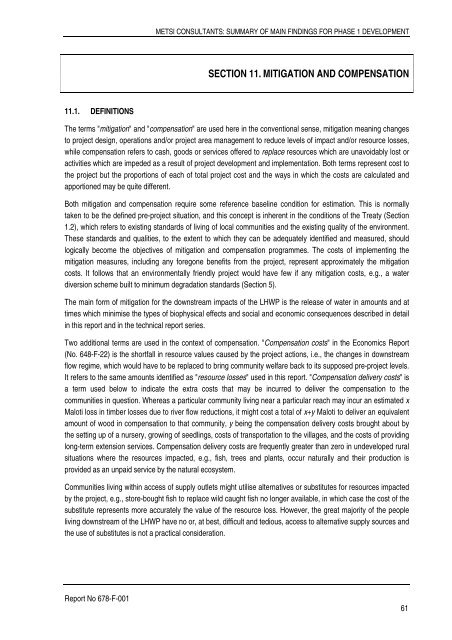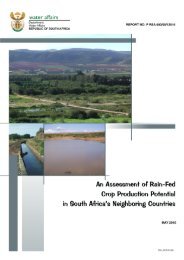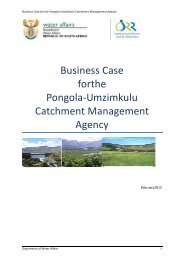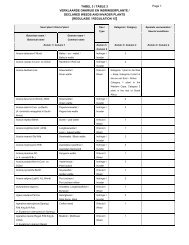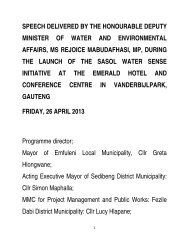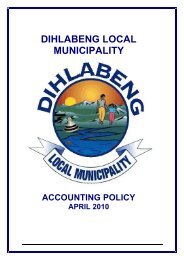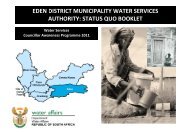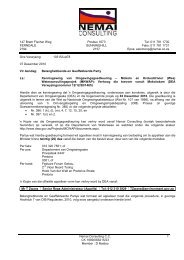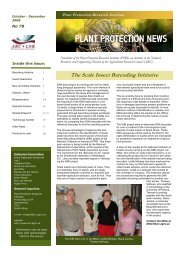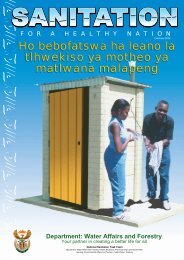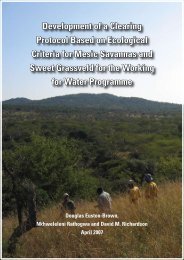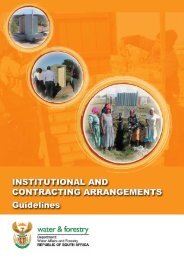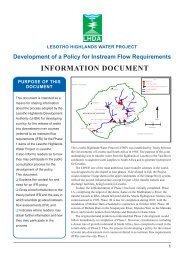Metsi Consultants - DWA Home Page
Metsi Consultants - DWA Home Page
Metsi Consultants - DWA Home Page
You also want an ePaper? Increase the reach of your titles
YUMPU automatically turns print PDFs into web optimized ePapers that Google loves.
11.1. DEFINITIONS<br />
Report No 678-F-001<br />
METSI CONSULTANTS: SUMMARY OF MAIN FINDINGS FOR PHASE 1 DEVELOPMENT<br />
SECTION 11. MITIGATION AND COMPENSATION<br />
The terms "mitigation" and "compensation" are used here in the conventional sense, mitigation meaning changes<br />
to project design, operations and/or project area management to reduce levels of impact and/or resource losses,<br />
while compensation refers to cash, goods or services offered to replace resources which are unavoidably lost or<br />
activities which are impeded as a result of project development and implementation. Both terms represent cost to<br />
the project but the proportions of each of total project cost and the ways in which the costs are calculated and<br />
apportioned may be quite different.<br />
Both mitigation and compensation require some reference baseline condition for estimation. This is normally<br />
taken to be the defined pre-project situation, and this concept is inherent in the conditions of the Treaty (Section<br />
1.2), which refers to existing standards of living of local communities and the existing quality of the environment.<br />
These standards and qualities, to the extent to which they can be adequately identified and measured, should<br />
logically become the objectives of mitigation and compensation programmes. The costs of implementing the<br />
mitigation measures, including any foregone benefits from the project, represent approximately the mitigation<br />
costs. It follows that an environmentally friendly project would have few if any mitigation costs, e.g., a water<br />
diversion scheme built to minimum degradation standards (Section 5).<br />
The main form of mitigation for the downstream impacts of the LHWP is the release of water in amounts and at<br />
times which minimise the types of biophysical effects and social and economic consequences described in detail<br />
in this report and in the technical report series.<br />
Two additional terms are used in the context of compensation. "Compensation costs" in the Economics Report<br />
(No. 648-F-22) is the shortfall in resource values caused by the project actions, i.e., the changes in downstream<br />
flow regime, which would have to be replaced to bring community welfare back to its supposed pre-project levels.<br />
It refers to the same amounts identified as "resource losses" used in this report. "Compensation delivery costs" is<br />
a term used below to indicate the extra costs that may be incurred to deliver the compensation to the<br />
communities in question. Whereas a particular community living near a particular reach may incur an estimated x<br />
Maloti loss in timber losses due to river flow reductions, it might cost a total of x+y Maloti to deliver an equivalent<br />
amount of wood in compensation to that community, y being the compensation delivery costs brought about by<br />
the setting up of a nursery, growing of seedlings, costs of transportation to the villages, and the costs of providing<br />
long-term extension services. Compensation delivery costs are frequently greater than zero in undeveloped rural<br />
situations where the resources impacted, e.g., fish, trees and plants, occur naturally and their production is<br />
provided as an unpaid service by the natural ecosystem.<br />
Communities living within access of supply outlets might utilise alternatives or substitutes for resources impacted<br />
by the project, e.g., store-bought fish to replace wild caught fish no longer available, in which case the cost of the<br />
substitute represents more accurately the value of the resource loss. However, the great majority of the people<br />
living downstream of the LHWP have no or, at best, difficult and tedious, access to alternative supply sources and<br />
the use of substitutes is not a practical consideration.<br />
61


